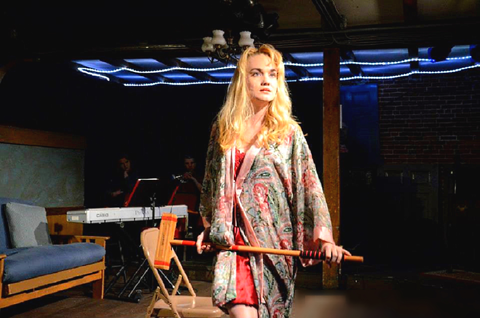 EXECUTING A SCENE Ashley Risteen in one of many guises in Ghosts’ Darlene. (photo by Kathleen Cavalaro) |
A creaky old oceanfront Victorian. Three adult siblings who don’t like each other, plus a couple of spouses. A codicil to their father’s will that requires them to spend an excruciating week together in the house. And, of course, various ghosts. These are the old-school ingredients of Ghosts of Ocean House, a genre-style thriller (nominated for the 2007 Edgar Award of Mystery Writers of America) by local playwright Michael Kimball, and directed by G. Matthew Gaskell for the Players’ Ring, in Portsmouth.
The siblings and their spouses are mismatched for maximum screwball, stuck-in-a-house effect. Uptight born-again Martin (Don Goettler) barks commands at his twiggy, blonde, ebulliently hyperactive new wife Darlene (Ashley Risteen), who reels around in high-heel slippers, cheerfully over-sharing about her blue-violet aura and her felonies. Meanwhile, Patsy (Adrienne Montezinos) has a mystery cell-phone interlocutor and tensions with her husband Oliver (Charlie Bradley), a laconic mathematician. Finally, the ironically-named Sunshine is a former psychologist haunted by her own ghosts—as are all of the gathered guests, who proceed to hash out the family’s past and the mysterious shenanigans in the library.
That library handsomely conveys a sense of old New England ghostliness on the main stage, with faded wooden furniture and spines of books, gauze, and dusty rose drapes at the window. Interludes here between scenes are evocative, pooled in moonlight-blue and the sounds of gulls and quiet piano. Some action is also staged on the house’s deck, played on a side-stage area near the entrance, and this allows a clever spatial juxtaposition: when characters look out on the “ocean,” ruminating on fears of the unknown, the actors are actually looking at the library, at one of their clan collecting herself or turning off lights. (There are some sight-line problems, though: don’t sit too far to house right in the center section, or you’ll miss seeing some of the action.)
Story-wise, once one suspends disbelief about the terms of the will (which are a little convenient as a restricting device), Ocean House offers some fun moments for mild shivers. Free-reeling Darlene, it will come as no surprise, is ripe for possession, and the chameleon-like Risteen, though somewhat hyperbolically directed in her first scenes, shifts into other states and voices with brio and nicely alarming contrast. Risteen, indeed, keeps things interesting throughout with a croquet mallet and the reflexes of a racecar driver, as she negotiates Darlene’s high ditziness and her subtler awareness, as she swerves between chaste kittenishness, specter-induced hysteria, and rage.
The story also involves a lot of family bickering, of arguing about the past and whose fault certain traumas were. As with the fighting of any family not our own, a little of this goes a long way—especially when it serves as a delivery mechanism for exposition—and Gaskell’s aggressive direction compounds the racket by keeping much of the acrimony at yelling volume. Martin is so severe to everyone—especially his wife, whom he treats like a 13-year-old—and Patsy is so frequently barking bitterly at either him or Oliver that it’s a genuine relief, and sometimes most genuinely revealing, when the characters’ words instead grow quieter, step back, or take a break entirely: Oliver’s wry remark, after a pause in the fighting, “Sad, how families don’t talk anymore”; Darlene’s wild but careful mania as she ploughs a tray of coffee mugs through a pile of jigsaw puzzle pieces, trying not to knock a single one off.